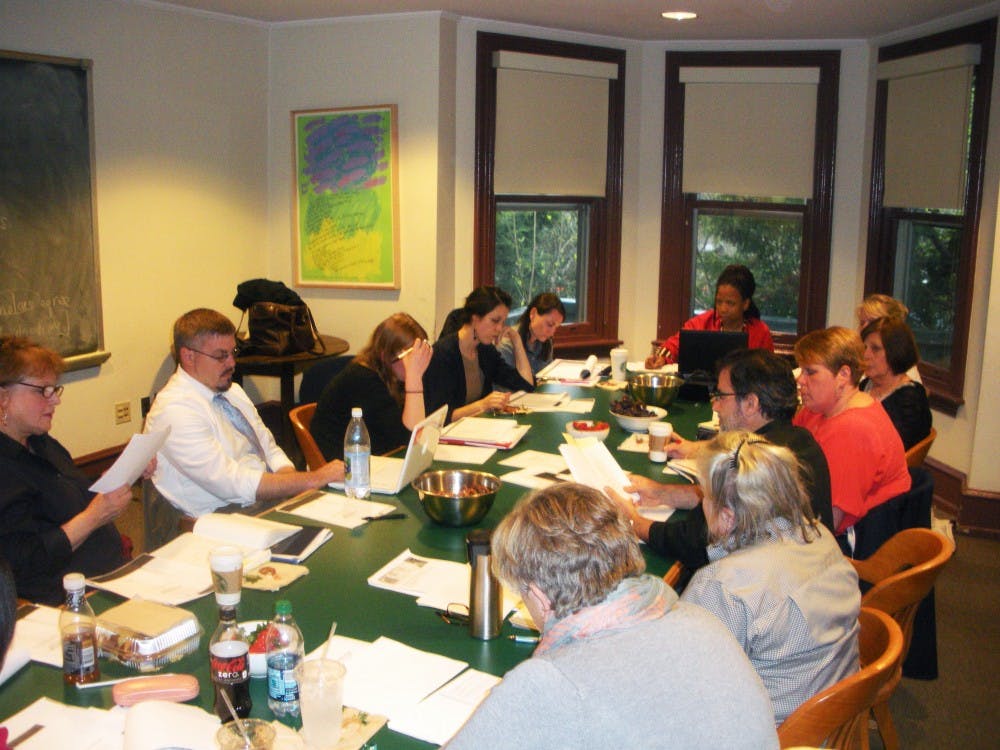
Philadelphia teachers at a professional development seminar taught by Penn professors and organized by the Teachers Institute of Philadelphia. Photo courtesy of Teachers Institute of Philadelphia.
The Teachers Institute of Philadelphia at Penn does for public school teachers what drafting does for bike racers, Thomas Alva Edison High School English teacher Sydney Coffin explained over the phone on Sunday.
By following the leading bike in a group, other bikers benefit from drafting because they can move quicker by racing together than they would on their own.
Through Penn’s TIP program, “you’re surrounded by really efficient, highly energetic teachers and you kind of get pulled along with them,” Coffin said.
And for drafting to work most effectively, you have to be as close as possible to the bike — or teacher — next to you.
The Teachers Institute of Philadelphia brings together Penn faculty and public school teachers from West and Southwest Philadelphia to learn from each other and from Penn professors. In honor of TIP’s 10th year, the program — run through the Office of the Provost — is fundraising $10,000 to continue teaching K-12 teachers about developments in fields they often teach to their students.
The interactions between Penn professors in fields from biology to poetry give teachers a chance to update their content knowledge in those fields and pass that on to their students, Director Alan Lee said. School districts in general don’t offer content updates for their faculty members, but TIP is able to further Penn’s mission of engaging locally by providing teachers with a chance to learn more about their subject areas, Lee added.
Through 14 sessions between January and May, teachers create lessons they can use in their classrooms based on presentations by Penn professors. In the 10 years since the program’s founding, Philadelphia teachers have created 300 lessons available online for any teacher to use.
“Even though it’s a challenge,” since the program is outside a teacher’s normal work hours, “you get something back exponentially more valuable: You get invigorated,” Coffin said.
The seminars always focus on how to make new content interesting to their students, he added. “Every teacher is saying ‘I know what will excite my students,’” he said.
The program works with the School District of Philadelphia, which originally supported it with funding. Now, as a result of budget cuts, the school district simply gets the word out about the program to Philadelphia teachers, co-founder of TIP Rogers Smith said. “Because their professional development has been cut they see us as even more valuable,” Smith added.
Lee said most teachers rank the $1,000 stipend they receive for participation low on the list of things that were best about the seminars, just calling it an added perk. “Where else do you learn the updated or the latest interpretation of American poetry since the 19th century? You can’t do it in an afternoon or during summer programs,” he said.
English professor and Director of the Kelly Writers House Al Filreis said lots of teachers are scared of poetry — whether it’s because they don’t understand it themselves or they think their students can’t connect to it. In his seminar, he presented “cool and hip poetry that [the teachers] had probably not encountered before” with a technique of breaking down the interpretation of poems among the group’s members. “I was not only teaching the material, but I was teaching how I teach the stuff,” he said.
For some teachers, the opportunity is also priceless. Lee, a public school teacher in Philadelphia for about 30 years, said that participants in TIP love the chance to “geek out” on being a teacher. On the last day of one of his seminars, many of the teachers began crying because of how impacted they felt by the program, Filreis said.
Working with experienced teachers in these seminars also gives Penn faculty members the chance to engage in local schools, Filreis added. “This is a really effective way for a faculty member that loves and admires the material to get that material out into the schools,” he said. “This is like a direct feed into the Philadelphia schools.”
Coffin said he looks forward to seeing TIP expand the content offered in the seminars. But for Smith, who co-chairs TIP’s Faculty Advisory Committee, the main concern is keeping the quality of the seminars and their effect consistent. “We hope that at a minimum we are raising the bar for professional development programs.”
The Daily Pennsylvanian is an independent, student-run newspaper. Please consider making a donation to support the coverage that shapes the University. Your generosity ensures a future of strong journalism at Penn.
DonatePlease note All comments are eligible for publication in The Daily Pennsylvanian.





